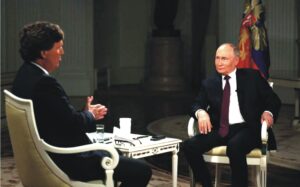Ayn Rand’s hatred of communism is entirely understandable, but it was not the product of impartial philosophical analysis. She had her own, very personal, reasons.
Brought up to the age of twelve to a comfortable bourgeois lifestyle, it must have been upsetting, to say the least, to have that snatched away when her father’s business was confiscated by the Bolsheviks. Things got worse, and she claimed to have faced starvation on several occasions during the civil war, but she somehow survived to be, at the age of only sixteen, one of the first women ever to be enrolled in a Russian university. For her, then, the revolution had not been all bad, and when, In October 1924, she graduated from the Petrograd State University, it was with a degree in history. What, then, might she have made of the historical expertise demonstrated by the man who, a hundred years later, was head of a Russian state that had retained many of the features she had hated as a student?
She might not have been impressed.

Putin and Carlson. A meeting of historians?
When Vladimir Putin decided to allow himself to be interviewed by Tucker Carlson, he would have known he was in for an easy ride. So easy, as it turned out, that he actually complained about it afterwards. That did not, however, prevent him from having a full transcript posted on the President of Russia website, where the reader quickly comes to realise that to him, history is all important. It is, however, a very strange history, and it had quite a strange introduction. It began with him saying to Carlson :
Vladimir Putin “You were initially trained in history, as far as I know?”
And on being told that that was indeed the case, he responded
Vladimir Putin “So if you don’t mind I will take only 30 seconds or one minute of your time to give you a brief historical background.”
That one minute stretched to twenty, and went back all the way to 862, when the citizens of Kiev decided they needed a king. Rather than choose a Slav, however, they chose a Swede, and the kingdom he ruled became known by a variant of the Finnish name for Sweden.
Ruotsi.
Not something to dwell on, perhaps, and Vladimir jumped hurriedly forward a hundred years, and ever more rapidly until there appear on the scene what seem to be his least favourite people, in Europe at least,
The Poles.
Referring to what is now western Ukraine, he noted that
Vladimir Putin “these lands became part of the Polish-Lithuanian state”.
That was quite an admission, and it was clearly all going a bit fast for Tucker, despite his background in history, because it was at this point he asked his second of what turned out to be a rather small number of questions.
Tucker Carlson: “I beg your pardon, can you tell us what period… I am losing track of where in history we are.”
Vladimir Putin: “It was in the 13th century.”
Now the 13th Century started in 1201 and ended in 1300, but Poland-Lithuania did not came into existence, in a very personal way, until Grand Duke Jogaila of Lithuania, better known to history (and Wikipedia) as Władysław II Jagiełło, married the Pollsh queen Jadwiga and accepted Catholic Christianity. That was in 1399, a hundred years, almost, after the end of the 13th Century.
Was this was a mere slip of the tongue, or perhaps lost in translation? We have to think that possible, but this was printed on the official web site of the President, and if we can’t trust that, what, in the Russian media, can we trust? It is, however, a surprising century to make, and propagate, a mistake about, because it is arguably the most important century in the whole of Russian history.
On the 6th of December 1240, the city now known as Kyiv, then the capital of the Kievian Rus, was taken by the Mongol-Tatar army of Batu Khan and was razed to the ground. The invaders did not stop there, but swept through all of lesser states of the eastern Slavs, except for the Republic of Novgorod in the north, which they were content to make a tributary. But that republic was under pressure from the Swedish crown and the German crusaders, and power gradually moved away from to break-away cities of the Republic in the more fertile lands to the south. The ultimate winner, because of considerable Tatar assistance, was Moscow.
The rest, as they say, is history.
It is odd that Putin, the self-styled historian, should have got the dates so badly wrong.
.
